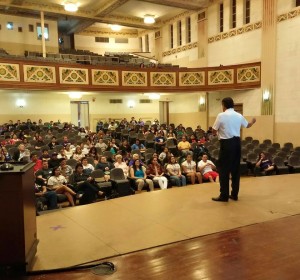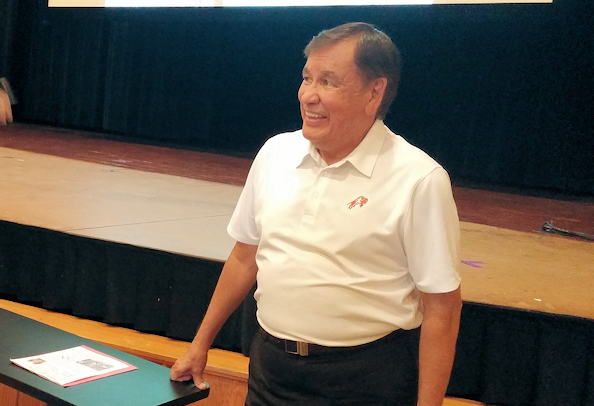Haskell Alum and Olympic Gold Medalist Billy Mills Visited Haskell Indian Nations University on Friday with an Inspiring Message
By Tyler Jones, @TylerJonesLive
In October 1964, Billy Mills captured the gold medal in the Tokyo Summer Olympics for the U.S. in the 10,000 m event. What makes Mills different though, was the story behind it. Billy Mills was more than a champion of track and field, he was the people’s champion.
 On March 17th, Mills spoke to the students of Haskell Indian Nations University, with an inspiring address, telling his story and encouraging young people. Haskell President, Dr. Chenault stated that, “I’m just thrilled that students were able to hear his story from him and to think about the impact they can make as well.” Mills is an alum of the Haskell Institute and a member of the Oglala Lakota (Sioux) Tribe.
On March 17th, Mills spoke to the students of Haskell Indian Nations University, with an inspiring address, telling his story and encouraging young people. Haskell President, Dr. Chenault stated that, “I’m just thrilled that students were able to hear his story from him and to think about the impact they can make as well.” Mills is an alum of the Haskell Institute and a member of the Oglala Lakota (Sioux) Tribe.
Mills was orphaned when he was just twelve years old and later attended the Haskell Institute. Mills recalls that he came to Haskell and he could not make the Football team, but found another love, Cross Country. At Haskell, Mills was the first ever Kansas High School Cross Country Champion. Mills says, “The dream was born here at Haskell.”
After a successful high school career at Haskell, Mills moved on to the University of Kansas on athletic scholarship. Mills ended up spending 4 years at the Haskell Institute and the University of Kansas. Mills says, “Lawrence is home in a way, but where I feel at home is the Haskell Campus and KU Campus.”
As a Jayhawk, Mills was a three-time NCAA All-American and won the individual Big Eight championship in 1960. While it appeared that Mills’ future was in racing, Mills enlisted in the Marie Corps after graduating with his Physical Education degree. Mills prepared for the 1964 Summer Olympics, while still holding a position as First Lieutenant in the Marine Corps.
When the 1964 Summer Olympics Games rolled around, Mills says he was virtually unknown, “I go to the Olympic Games ranked 8th in the world, unranked in the United States. My 10,000 m time (going into the game) was 12 seconds faster than the #1 American and yet I was still unranked in the U.S.” There may have been doubters, but Mills said, “I truly felt I was going to win.”
In order to win the 10,000 m, Mills would have to go through the world’s best. The favorite was Ron Clarke of Australia, who at the time was the world record holder of the 10,000 m. Mills would also be challenged by defending champion Pyotr Bolotnikov of the Soviet Union and Mohammed Gammoudi of Tunisia.
Despite competing with Gammoudi, Mills says that Gammoudi encouraged him, “He beat me the year before in Belgium and told me, Billy, more speed. I practiced for Tokyo for a year and he told me, Billy, too much speed.” Mills took that advice and in the final seconds passed Clarke and Gammoundi to win the 10,000 m.
Mills said, “When I won, I realized I choreographed the moment, I orchestrated the moment, but that moment was a gift.” On that day, Mills recalls that he felt as if he had wings on his feet. To this day, Mills is still the only American to win the 10,000 m.
Since retirement, Mills has become a spokesperson for Running Strong for American Indian Youth. The foundation has started a Dream Seeking Fund, which is planning to give ten $10,000 grants to ten students each year for the next five years. In 2012, President Obama awarded Mills with the Presidential Citizens Medal for his work with the foundation. Haskell President Dr. Chenault said, “Mills has a commitment to empower young people throughout the world.”
Mills inspired the Haskell audience on Friday. His message was clear, “It’s the journey, not the destination that will empower us.” Mills concluded with a simple message of, “Follow your dreams.”
(Note: Story courtesy the Haskell Indian Leader Student Newspaper)
